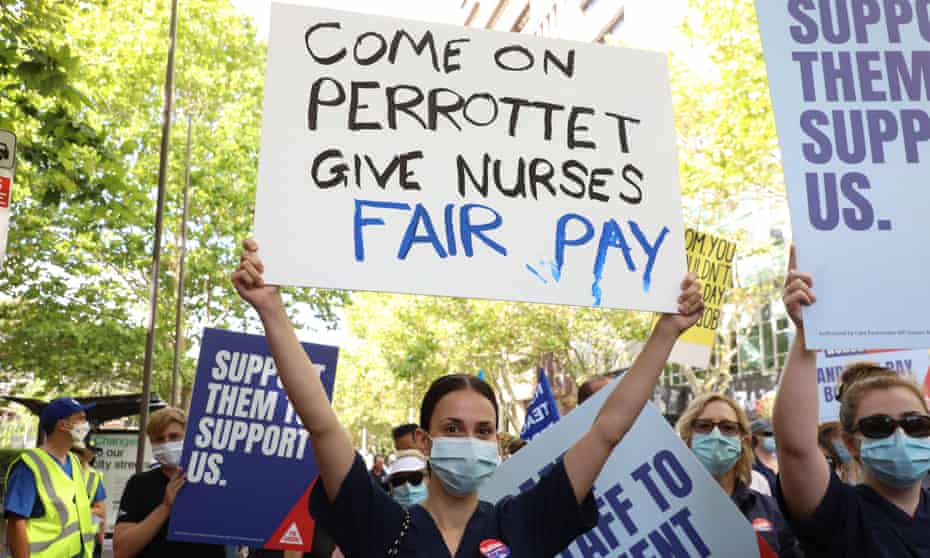Extract from The Guardian
Workers have a role to play in demanding higher pay, but the Coalition has spent years condemning ‘weak-kneed’ employers who offer good wages.

The whole point of abandoning what was once called “centralised wage fixing” and deregulating the labour market over the past 30 years was to put employers in charge of deciding how much they pay their employees. And, guess what, on the whole Australian employers have decided to boost their profits rather than boost their workers’ wages.
Just as Scott Morrison wants to see more women get into parliament (but not at the expense of men) and wants to see housing affordability improve (without house prices actually falling) the prime minister is all in favour of stronger wage growth – but not at the expense of higher profits. Unfortunately for Australians struggling with the rising cost of living, they can’t feed magic pudding to their kids.
Australia’s cost of living crisis is hurting ordinary households, and it won’t be over soon
The share of GDP flowing to workers has declined steadily since the Coalition came to power, from 53.2% in 2013 to about 50.6%. To put that decline into context, if the wage share of GDP had remained steady since Tony Abbott came to power, Australian workers would be taking home an additional $49bn in their pay packers this year. To put that in perspective, we only spend $51bn on the entire aged pension.
“If this is not done, then we risk seeing something akin to the wages explosion of the pre-accord era.”
While Abetz was wrong about the risks of a “wage explosion” in Australia, he was right that Australian employers need to “take responsibility” for the impact of the low wages they have been offering, not just on their workers but on the economy as a whole.
If the biggest employer in Australia freezes pay then average wage growth has to fall
As both the Reserve Bank of Australia and Treasury have made clear, Australia’s low wage growth is a major drag on the economy. The tens of billions of dollars that have been kept from Australian workers have obviously not been spent in local shops, haven’t created local jobs and, in turn, have made it harder for some businesses to offer higher wages.
National wage growth is not some abstract concept like “consumer sentiment” or an arbitrary, self-imposed speed limit like “23.9%” – the Coalition’s magic number to suppress the tax-to-GDP ratio.
While there is no doubt wage growth and the wage share of national income are at all-time lows, there is also no doubt that Scott Morrison is about to blame either employers or his government for the problem. Which means the only people left to blame are workers – a bit like blaming starving people for not eating enough.
Earlier this year the treasurer, Josh Frydenberg, argued that “switching jobs allows workers to move up the job ladder for better pay”. While this may be sometimes true for a tiny minority, it is erring on the side of delusional for most of Australia’s 13.3 million workers looking for a pay rise.
It is true that workers have a role to play in demanding higher pay, but it is also true that three successive governments have worked tirelessly to discourage, and even criminalise, employees working together to negotiate wage rises and go on strike if they fail.
Likewise, as the largest employer in Australia, the commonwealth government has relied heavily on pay freezes for public servants. Needless to say, if the biggest employer in Australia freezes pay then average wage growth has to fall. Again, it’s not that complicated.
In the great “whodunnit” of low wage growth in Australia, big business lobby groups are quick to provide their alibis for why they can’t give their workers a pay rise. But while everyone seems to have an excuse, the evidence is clear: corporate profits are up 20% through the pandemic, the first time in Australian history where profits have increased, far outstripping wages.
Low wage growth in Australia didn’t happen by accident. It’s the system working as intended. The only question is whether politicians will keep blaming workers for their lack of bargaining power – or start trying to fix it.
Dr Richard Denniss is chief economist at the Australia Institute, an independent thinktank based in Canberra. Twitter: @RDNS_TAI
No comments:
Post a Comment